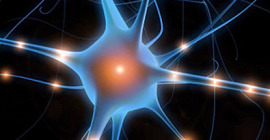Brain activity during specific tasks may predict how well patients with major depressive disorder respond to the experimental antidepressant scopolamine. The finding suggests that brain imaging might help identify good candidates for the treatment.
Depression is thought to be caused by a complex combination of genetic, biological, environmental and psychological factors. People with major depression have feelings of sadness, loss, anger or frustration that interfere with daily life for weeks or longer. Symptoms can also include memory loss and trouble focusing.
A variety of antidepressants that target chemicals in the brain are used to treat major depression. Unfortunately, antidepressants must typically be taken for several weeks before working, and some may not work well in certain people. Patients may need to try several treatments over many weeks before finally getting symptom relief.
Dr. Maura Furey and colleagues at NIH’s National Institute of Mental Health (NIMH) have been studying scopolamine, a drug commonly used to treat motion sickness. The researchers discovered in 2006 that it can also improve depression in just a few days. Although fast-acting, scopolamine isn’t effective in all patients.
To develop a way to predict the drug’s effects in advance, the researchers studied 36 adults (ages 18 to 55), 15 with major depression and 21 without. The participants underwent functional MRI (fMRI) to measure brain activity as they completed tasks that involved processing visual information. When asked to pay attention to different aspects of images that show emotion, people with major depression have unique patterns of brain activity. The study was designed based on the idea that depressed patients tend to have a processing bias—they process and remember negative emotional information (such as sadness) more than positive (happy) or neutral information.
Get The Latest By Email
For some trials, participants were asked to pay attention to, and remember, the emotional expression of faces flashing on a computer monitor. For other trials, they were asked to pay attention only to the identity, or non-emotional features, of the faces. After scanning, and over the following several weeks, the participants randomly received infusions of scopolamine or a placebo saline solution. Their mood changes were monitored with depression rating scales.
that 11 of 15 participants with major depression had a significant decrease in depression symptoms in response to scopolamine treatment. The effectiveness of the treatment correlated with brain activity during the task only when patents were paying attention to emotion features. The correlation was found in a brain area known as the bilateral middle occipital cortex. In addition, brain activity in the same region was altered within just a few hours after infusion of scopolamine—well before any antidepressant effects. Activity in this region might thus serve as a biomarker to inform treatment strategies.
These findings suggest that visual processing may play a role in depression. They also show that monitoring areas of the brain that respond to emotional stimuli might be a feasible way to guide treatments for major depression.
We have discovered a potential neuroimaging biomarker that may eventually help to personalize treatment selection by revealing brain-based differences between patients,” Furey says.










